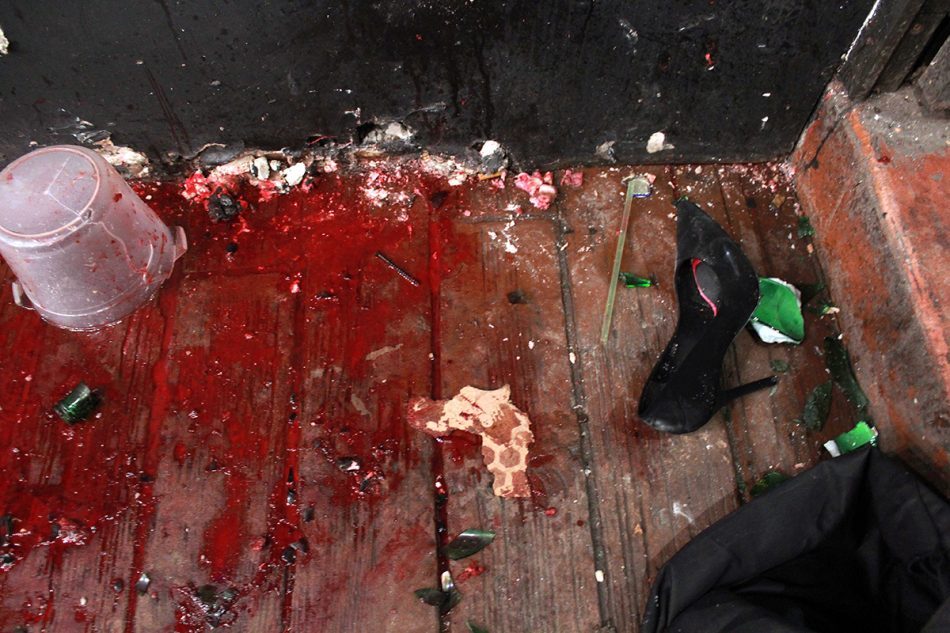
In the State of Guerrero, on the night of September 26, 2014, students from the Escuela Normal Rural in Ayotzinapa were on their way to Mexico City. When they arrived in Iguala, they were intercepted by members of the police and a local drug trafficking group, the “United Warriors,” who opened fire, resulting in the death of five youths and more than twenty were wounded. Forty-three of them disappeared, and are now known as “the 43.”
“It was the State,” said the Mexican society then, like that inscription on the floor of the Zocalo itself. Whether by action or omission, the death toll is always the responsibility of the State but more so in this case because the mayor of the city of Iguala and his wife had direct links with organized crime. It was the final illustration of the capture of political power through drug trafficking. If it wasn’t the State, well, surely it was the state.
Iguala illustrates the illegality that corrodes, fragmentizes, and finally appropriates public institutions in Mexico and many countries of the region. This became so brutally explicit at the time that the Attorney General resorted to a legal and conceptual artifice to shield the federal government. “The Mexican State is not culpable for Iguala”, he said categorically.
The government’s highest judicial authority thus certified a reality already debated in the literature on transitions: “subnational authoritarianism.” The term depicts a system under which a political order of democratic national institutions coexists, adjoining and superimposed on a series of authoritarian provincial regimes. It is often a functional political pact: regional elites retain their enclaves, while the central government manages to divert demands to states and relocate conflicts away from the nation’s capital.
The problem is that in Mexico, there is a subnational “criminal” authoritarianism, whereby regional political authorities are often instruments of drug trafficking. Although a dubious one, “Iguala is not the Mexican State” constitutes an attempt to protect the State with uppercase ‘S’ from the state with lowercase ‘s:’ the latter is of the narcos. The aim of protecting the State to preserve fundamental cohesion, a prerequisite for exercising the monopoly of law and force. That is to say, to continue being a State.
Well, this attempt at protection may have vanished entirely in the recent events in Culiacan, State of Sinaloa. The police arrested Ovidio Guzman, son of El Chapo, the leading criminal serving his sentence in the United States. The cartel launched a massive attack against the police with greater firepower and superior logistical deployment. It was a real battle that ended when Ovidio Guzman was released by order of President Lopez Obrador himself because “the arrest of a criminal cannot be worth more than people’s lives.”
Here it was the State that de facto exonerated a proven criminal. State abdication is never good news. It sends out a message of vulnerability and impotence to transnational criminals. Without the State, such massacres would become more frequent since subnational criminals will likely operate on a national scale. It could only result in authoritarianism, pure, harsh, and illegal.
That future might well already be clear to us. Criminal authoritarianism already prevails at the peak of political power in Venezuela. It operates all over the country with territorial franchises for the exploitation of different resources. Meanwhile, the Central American nations are small and have low state-capacity. Consequently, the collusion of organized crime with politics is a common theme in newspapers.
Organized crime groups seek their reward through the capture of Mexico- that of the State. This would guarantee the regional expansion of a system of domination whose productive base is constituted by an illicit business model. It would mean the termination of the legal, political, and coercive monopoly entity that we know, formerly the locus of legitimate authority. Of course, this would make democracy unviable because without the State there is no democracy.
The region could be heading toward the configuration of a parallel post-State (dis)order. Several quasi-feudal entities would emerge. Take “feudalism” as the image of a system of decentralized domination, a fragmentation of sovereignty. In this case, “feudalism” is associated with illegality and defining its norms informally. Thus, the role of the law would be vague, reducing the government to the arbitrariness of criminal clientelism.
Perhaps, all this is ecstatic futurology, I hope, and if anything, mere metaphors. But metaphors to pay attention to in light of the current instability of a convulsed continent.
Organized crime has huge comparative advantages. It is adaptive to post-industrial capitalism, thus flexible and efficient in this global world. It is one of the most profitable activities on the planet. It allocates resources better than anyone else. It does not pay taxes; trade wars do not impact it; it does not recognize borders, and it can resolve conflicts expeditiously, with violence.
Organized crime is part of our reality, an economic force that ended up becoming a political actor. It is present in each of the revolts that afflict the continent today. It is not a question of conspiracy theories; any analysis or design of politics must consider this severe threat as a crucial stakeholder variable.
It is not clear that today’s political leaders are up to the task. In this violent path, where no one benefits as much as organized crime, Latin America could very well lose democracy altogether. And with it, the possibility of organizing collective life in peace and civility.
Maybe this evokes the idea of a lost continent; it’s a hypothesis. Like Atlantis, it was destroyed by the Gods as a punishment for the corruption and greed of their people.
 Versión Español
Versión Español












